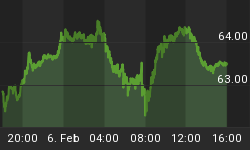Europe continues to smolder, but it is about to burst into outright flame. The 'private sector initiative' (PSI) discussions, which were supposed to be completed the Friday before last, continue. The leaks of an imminent deal continue, and eventually I am certain that a deal will be announced because eventually we will be down to just one bondholder still represented by the IIF. It is pretty clear by now - or it should be - that the PSI is no panacea. The only ray of hope to that process is that the approval of a 'haircut' (in the same way that Hannibal Lecter gave haircuts) would give the EU a fig leaf to approve a deal to send good money after bad, if it could overlook the failure to implement austerity measures that currently has German Finance Minister Schaeuble in a tizzy.
It would be a colossal mistake to agree to another €130bln bailout, even if the chances of it actually being disbursed would be slim (after all, remember the PSI process is necessary for the disbursement of the past-due tranche of the current bailout). And, honestly, I think the only reason they are continuing the charade is to give themselves more time to ready the Plan B default and/or Euro exit.
However, the market may not give them the time. Today Portugal's 10-year rate rose nearly 200bps (see Chart, source Bloomberg), likely triggered in part by a headline saying "ECB cuts off bond buying as pressure mounts."

It didn't actually cut off bond buying, but it bought very little last week. It seems fairly clear that the limits of the ECB's ability to sterilize the transaction are nearby, if they have not already been reached, and no doubt some cooler heads have pointed out that failing to have enough buyers for a 7-day ECB tender would be much worse than allowing bond yields to reach free-market levels. After all, what's the difference to Portugal of 15% or 17% on 10-year notes? Neither level makes Portugal's situation even vaguely sustainable.
Now, I still think that U.S. equities rally once Greece formally announces it is defaulting, after a knee-jerk selloff. That's a harder call now than it was when I first made it October 4th with the S&P at 1124, though, and investors need to be aware that if Greece also leaves the Euro at that time (as is likely) then that creates a chance of the 'unzipping' trade I talked about here. However, back in October the VIX was also at 41, and it's now at 19.4. I think buying medium-term out-of-the-money calls on equities, especially with all central banks working the inflationary bellows, is a viable strategy here (and that's coming from someone who has spent most of the last decade either out of the market, or short, to good effect).
In the near-term, be aware that Portugal is scheduled to sell 105-day and 168-day bills on Wednesday. The LTRO makes that operation basically risk-free for many banks, so the auctions will go fine (look at the Bloomberg chart below for one of the weirdest yield curves you have seen in your life, except for the fact that it's becoming normal in much of Europe). And when the auction goes fine, the headlines will trumpet the fact that Portugal raised money around 5% or wherever and is doing just fine, thank you. You shouldn't believe it, but some investors will use that as an excuse to relax.

Back in the U.S., our economy continues to do reasonably well. Personal Income beat expectations slightly with a +0.5% rise. The core PCE deflator (remember, that's what the Fed targets) rose from 1.7% year-on-year to 1.8%. This was a surprise, as the consensus forecasts prior to the number were for the number to be unchanged at 1.7%. At 8:32ET or so, Bloomberg re-published the consensus as 1.8%. Wow, those economists are pretty good once they have the number. You can see below the chart (Source: Bloomberg) of the core PCE Y/Y (which is now just another inflation index that the Fed thinks is "contained"), which has just risen to three-year highs.

Today was a 'risk-off' day (I am so tired of that phrase), and so commodities suffered along with equities with the DJ-UBS down 1.1% with every category (softs, precious, industrials, etc) down. The dollar was up slightly. And yet, TIPS rallied yet again, with the new 10y TIPS down to -0.26%. Nominal rates continue to trade in my face, with the 10y falling to 1.85%, but absent an unzipping I am happy to remain short in an unlevered way (TBF) and to be long inflation through commodities (primarily USCI) and breakevens (via new ETFs INFL and RINF).
Tuesday's data includes the Employment Cost Index for Q4 (Consensus: +0.4% from +0.3%) along with the Case-Shiller Home Price Index, the Chicago Purchasing Managers' Report from January (Consensus: 63.0 from 62.2), and January Consumer Confidence (Consensus: 68.0 from 64.5). I expect to see the Chicago PM express some strength but would not be surprised to see the Consumer Confidence figure, which has risen rapidly over the last few months, fall short of expectations. Obviously, European actions are in the immediate picture more important once again.















